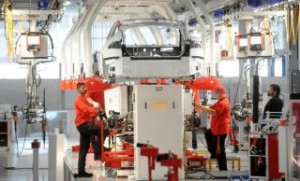 Things got even worse for Tesla Motors. The National Highway Traffic Safety Administration is recalling the Model S after its third fire in six weeks; and on Wednesday of last week, three workers in its Fremont, Calif., plant were injured by hot metal on the production line. There was no fire or explosion at the plant, and the workers were injured by hot metals from a low pressure aluminum casting press, the company said. The workers suffered moderate to serious burns. They were taken to the Valley Medical Center in San Jose and treated for second-degree burns. CEO Elon Musk visited the injured workers on Wednesday night; he told reporters that one is expected to make a full recovery, but one worker had particularly bad burns to his hands. It’s not clear yet what will be needed for his treatment.
Things got even worse for Tesla Motors. The National Highway Traffic Safety Administration is recalling the Model S after its third fire in six weeks; and on Wednesday of last week, three workers in its Fremont, Calif., plant were injured by hot metal on the production line. There was no fire or explosion at the plant, and the workers were injured by hot metals from a low pressure aluminum casting press, the company said. The workers suffered moderate to serious burns. They were taken to the Valley Medical Center in San Jose and treated for second-degree burns. CEO Elon Musk visited the injured workers on Wednesday night; he told reporters that one is expected to make a full recovery, but one worker had particularly bad burns to his hands. It’s not clear yet what will be needed for his treatment.
NHTSA Administrator David Strickland said his agency made an independent decision to investigate 13,100 Model S cars on U.S. roads. Tesla CEO Elon Musk wrote a long message that was posted this week on the company’s website and sent out in an email. He said Tesla will update the software on the Model S to increase their ride heights at highway speeds. He also welcomed a NHTSA investigation into the fires. As for media coverage beyond the recall and the Tesla factory incident, Musk is getting more media coverage on comments he’s made that the automaker may place an electric pickup on the market someday.
Military biofuels lambasted but not disappearing
While Republicans in Congress and a few independent energy experts have been howling that the Pentagon is spending way too much on biofuels (such as $26 per gallon for fuel made from algae and cooking grease), the military probably won’t be backing off. The Navy is sticking with its intent of purchasing 170 million gallons of biofuel a year to meet its goal of getting half its energy from renewable resources by 2020. The Obama administration is staying with plans to spend $510 million to help construct advanced biofuel plants. For now, the cost is steep, but many are hoping the investment advances development and support for the fuels.
Green Car Reports’ Best Car to Buy winner announced
As covered recently, Green Car Reports joined colleagues in nominating finalists for its greenest car of the year award. The 2014 finalists were the BMW i3, Chevrolet Cruze Diesel, Chevrolet Spark EV, Honda Accord Hybrid, and the Mazda 3. For the fourth annual Best Car to Buy award, the winner was the 2014 Honda Accord Hybrid. The fact that it’s comfortable, quiet, and stylish played into the decision, plus its fuel economy being in the 40 mpg to 52 image range.
And in other clean transportation news…..
- Chrysler Group has developed a storage tank for compressed natural gas that’s quite similar to human lungs; it will also allow for natural gas to be more easily used in vehicles. Details on when this will be coming out aren’t available yet; the company says that its design uses smaller compartments inside a larger tank to increase fuel capacity and storage. That can be compared to the alveoli within the human lung.
- DHL has added 63 new liquefied natural gas (LNG) powered delivery vehicles in Europe, replacing diesel powered vehicles. That makes for 101 LNG vehicles in its fleet, with another 51 on order.
- Hyundai will be the third automaker (along with Honda and Toyota) to release a hydrogen-powered concept car at the LA Auto Show.
- Zero Waste Energy is working on producing 100,000 diesel equivalent gallons of compressed natural gas fuel and compost. This comes from an anaerobic digestion facility in the San Francisco bay area; it will convert 112,000 tons per year of food and waste into alternative fuel.
- Alliance AutoGas just received new EPA certifications for propane covering more than 50 vehicle platforms. Four additional certification are finished and waiting for final EPA authorization, and five more are in process and should be completed by the fourth quarter of 2013, says Stuart Weidie, president of Alliance AutoGas.
- Ford is going to test a tiny concept car in Brazil. The Ka concept microcar is smaller than the Fiesta and is the second recent model developed by Ford’s Brazilian studio. Its new EcoSport is going out to showrooms around the world.
- Intelligent Energy has launched a new product called Upp, offering portable power for connected devices. It’s built on fuel cell technology, and it’s a personal energy device for charging portable electronic devices.
- A new MarketsandMarkets study on the Smart Transportation Market forecasts that the market will reach more than $102.31 billion in annual sales by 2018. What makes up smart transportation? The report identifies the market as covering ticketing management, parking management, passenger information, traffic management, and ancillary services.



